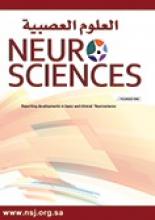Research ArticleOriginal Article
Open Access
A cross-sectional study to evaluate metabolic and demographic factors affecting cognitive function among low educated internal medicine outpatients
Feride Alakus, Serife A. Helvaci, Mustafa Temizel and Yucel Arman
Neurosciences Journal January 2017, 22 (1) 38-43; DOI: https://doi.org/10.17712/nsj.2017.1.20160259
Feride Alakus
From the Internal Medicine Clinics (Alakus, Arman, Helvaci), Okmeydani Training and Research Hospital, and the Department of Internal Medicine (Temizel), Medicana International Hospital, Istanbul, Turkey
MDSerife A. Helvaci
From the Internal Medicine Clinics (Alakus, Arman, Helvaci), Okmeydani Training and Research Hospital, and the Department of Internal Medicine (Temizel), Medicana International Hospital, Istanbul, Turkey
MDMustafa Temizel
From the Internal Medicine Clinics (Alakus, Arman, Helvaci), Okmeydani Training and Research Hospital, and the Department of Internal Medicine (Temizel), Medicana International Hospital, Istanbul, Turkey
MDYucel Arman
From the Internal Medicine Clinics (Alakus, Arman, Helvaci), Okmeydani Training and Research Hospital, and the Department of Internal Medicine (Temizel), Medicana International Hospital, Istanbul, Turkey
MD
References
- ↵
- Cunningham EL,
- McGuinness B,
- Herron B,
- Passmore AP
- ↵
- McKhann GM,
- Knopman DS,
- Chertkow H,
- Hyman BT,
- Jack CR Jr.,
- Kawas CH,
- et al.
- ↵
- Gorelick PB,
- Scuteri A,
- Black SE,
- Decarli C,
- Greenberg SM,
- Iadecola C,
- et al.
- ↵
- Timmons S,
- Manning E,
- Barrett A,
- Brady NM,
- Browne V,
- O’Shea E,
- et al.
- ↵
- Peters R,
- Collerton J,
- Granic A,
- Davies K,
- Kirkwood T,
- Jagger C
- ↵
- Fillenbaum GG,
- Heyman A,
- Wilkinson WE,
- Haynes CS
- ↵
- Creavin ST,
- Wisniewski S,
- Noel-Storr AH,
- Trevelyan CM,
- Hampton T,
- Rayment D,
- et al.
- ↵
- James PA,
- Oparil S,
- Carter BL,
- Cushman WC,
- Dennison-Himmelfarb C,
- Handler J,
- et al.
- ↵
- Molloy DW,
- Standish TI
- ↵
- Vertesi A,
- Lever JA,
- Molloy DW,
- Sanderson B,
- Tuttle I,
- Pokoradi L,
- et al.
- ↵
- Güngen C,
- Ertan T,
- Eker E,
- Yaşar R,
- Engin F
- ↵
- Rzezak P,
- Squarzoni P,
- Duran FL,
- de Toledo Ferraz Alves T,
- Tamashiro-Duran J,
- Bottino CM,
- et al.
- ↵
- Stern Y,
- Habeck C,
- Moeller J,
- Scarmeas N,
- Anderson KE,
- Hilton HJ,
- et al.
- ↵
- Gomes Gde C,
- Teixeira-Salmela LF,
- Fonseca BE,
- Freitas FA,
- Fonseca ML,
- Pacheco BD,
- et al.
- ↵
- Wajman JR,
- Oliveira FF,
- Schultz RR,
- Marin Sde M,
- Bertolucci PH
- ↵
- Smeulders ES,
- van Haastregt JC,
- Ambergen T,
- Stoffers HE,
- Janssen-Boyne JJ,
- Uszko-Lencer NH,
- et al.
- ↵
- Peters R,
- Beckett N,
- Forette F,
- Tuomilehto J,
- Clarke R,
- Ritchie C,
- et al.
- ↵
- Hughes TM,
- Sink KM
- ↵
- Kherada N,
- Heimowitz T,
- Rosendorff C
- ↵
- Ballard C
- Sharp SI,
- Aarsland D,
- Day S,
- Sønnesyn H,
- Alzheimer’s Society Vascular Dementia Systematic Review Group
- ↵
- Waldstein SR,
- Elias MF
- Waldstein SR,
- Katzel LI
- ↵
- Feigin V,
- Ratnasabapathy Y,
- Anderson C
- ↵
- Peters R,
- Collerton J,
- Granic A,
- Davies K,
- Kirkwood T,
- Jagger C
- ↵
- Tang-Wai DF,
- Knopman DS,
- Geda YE,
- Edland SD,
- Smith GE,
- Ivnik RJ,
- et al.
In this issue
A cross-sectional study to evaluate metabolic and demographic factors affecting cognitive function among low educated internal medicine outpatients
Feride Alakus, Serife A. Helvaci, Mustafa Temizel, Yucel Arman
Neurosciences Journal Jan 2017, 22 (1) 38-43; DOI: 10.17712/nsj.2017.1.20160259
Jump to section
Related Articles
- No related articles found.
Cited By...
- No citing articles found.





